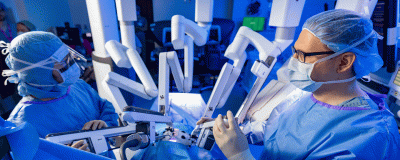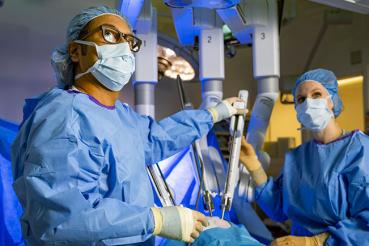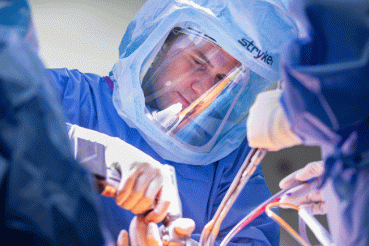Robotic surgery is a minimally invasive technique that Rush surgeons use for a wide range of procedures.
Using the da Vinci Surgical System, our surgeons make small incisions and then guide the robot's four arms and small instruments to perform complex surgical procedures. Robotic-assisted surgery can provide you with a number of benefits over traditional surgical approaches.
How Rush Uses the da Vinci Robot During Surgery
Robotic surgery does not mean the robot is actually performing your surgery. Instead, the system allows us to do the following:
- Maneuver with full control: We have full control over the procedure and use of the robot's computerized interface. This provides us with enhanced maneuvering of the surgical tools through small incisions.
- Reach difficult-to-see areas: We have the ability to work within areas that are difficult to see with the naked eye. For instance, with some head and neck tumors, surgeons can use transoral robotic surgery (TORS) to find and remove cancers that previously could not be found.
- Spare healthy tissue: Robotic surgery allows us to leave tissues not affected by cancer untouched. This ability typically allows for a quicker return to normal functioning.
Benefits of Robotic Surgery
Compared to traditional open surgery, robotic-assisted surgery offers you the following benefits:
- Decreased pain
- Lower likelihood of needing a blood transfusion
- Shorter hospital stay
- Smaller incisions and less scarring
- Quicker return to normal activity
Depending on your condition and overall health, robotic-assisted surgery is not the only — or sometimes even the best — minimally invasive option. We will discuss all your options with you.
Conditions Treated With Robotic Surgery
Depending on your specific condition and overall health, robotic-assisted surgery is often an option for treating the following conditions:
- Bladder cancer
- Colon and rectal cancers
- Diverticular diseases
- Endometriosis
- Fibroids
- Gynecologic cancers
- Oral cancer, throat cancer and other head and neck tumors
- Prostate cancer
- Spine conditions, including degenerative disc disease, herniated discs, scoliosis and more
Robotic Surgery Procedures Performed at Rush
- Hysterectomy
- Ovarian cystectomy
- Salpingo-oophorectomy
- Tubal re-anastomosis
- Excision/treatment of endometriosis
- Myomectomy
- Pelvic floor dysfunction (sacral-colpopexy, uterine ligament suspension)
- Cancer staging (lymph node dissections, omentectomy)
Multiport robotic procedures:
- Cystectomy
Multiport and single port robotic procedures:
- Lymph node dissection
- Nephrectomy
- Partial Nephrectomy
- Pelvic floor dysfunction (sacral-colpopexy, uterine ligament suspension)
- Prostatectomy
- Pyeloplasty
- Uteroplasty
- Ureteral reimplantation
- Hernia repairs
- Ventral/incisional
- Inguinal
- Separation of components
- Umbilical
- Bariatric
- Sleeve gastrectomy
- Duodenal switch
- Gastric bypass
- Diaphragmatic hernia
- Heller myotomy
- Appendectomy
- Cholecystectomy
- Distal pancreatectomy and splenectomy
- Liver Resection
- Lymph node dissection
- Left colectomy/sigmoidectomy
- Right colectomy/right hemicolectomy/ileocectomy
- Total colectomy
- Proctocolectomy
- Low anterior resection
- Abdominal perineal resection
- Rectopexy
- Wedge resection of lung
- Lymph node dissection
- Lobectomy
- Bilobectomy
- Segmentectomy
- Mediastinal mass resection
- First rib resection for thoracic outlet syndrome
- Sympathectomy
- Diaphragmatic plication
- Hiatal hernia repair
- Heller myotomy
- Diverticulectomy
- Nissan fundoplication
- Esophagectomy
- Decortication
- Pleurectomy and decortication
- Transoral Robotic Surgery:
- Treatment of tonsil cancer
- Base of tongue cancer
- Treatment for sleep apnea
- Gender affirmation
- DIEP flap harvest
Rush Excellence in Robotic Surgery
- Pioneers in robotic surgery: Rush University Medical Center was the first hospital in Chicago to install a high-definition version of the da Vinci Surgical System. This system integrates 3D HD laparoscopy with robotic technology to digitally extend the surgeons' eyes and hands during surgery.
- First in Chicago to use Mazor X: Rush University Medical Center was the first hospital in Chicago to use Mazor X Robotic Guidance Platform, a new technology that increases the safety and precision of spinal fusion surgeries while reducing the time needed for your procedure.
- Less invasive procedures, easier recovery: For head and neck cancers, ENT surgeons have expertise in transoral robotic surgery (TORS), which allows for significantly less scarring than open procedures. Typically, open surgeries require the splitting of bones and other structures in the mouth and throat. In contrast, with a TORS procedure, patients typically have a scar of several millimeters and no splitting of the bones.
- Leaders in bladder cancer surgery: Rush is one of a few health systems that have urologists who perform robotic cystectomy and intercorporeal urinary diversion for patients with advanced bladder cancer.
- Ever-growing expertise: Surgeons at Rush have performed more than 1,000 robotic surgeries and are highly skilled in these procedures.





